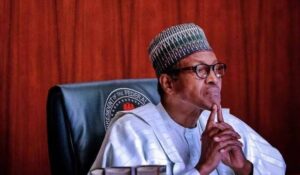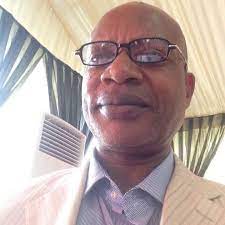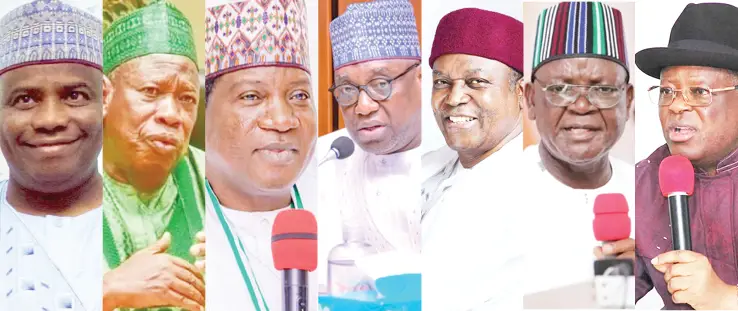
By Ehichioya Ezomon
Who’s next among the 19 outgoing State Governors to plead for forgiveness for “knowingly or unknowingly stepping on toes” in the course of governance?
Eighteen Governors of Abia, Akwa Ibom, Benue, Cross River, Delta, Ebonyi, Enugu, Jigawa, Kaduna, Kano, Katsina, Kebbi, Kogi, Niger, Rivers, Sokoto and Taraba will leave the stage on May 29 after eight years in office; joined by the Governor of Zamfara who failed re-election on March 18, 2023.

While nine Governors of Adamawa, Bauchi, Borno, Gombe, Kwara, Lagos, Ogun, Nasarawa and Oyo won re-election for a second term; the eight Governors of Anambra, Bayelsa, Ekiti, Edo, Imo, Kogi, Ondo and Osun were chosen at different off-season polls, and will accordingly leave office. Many of the Governors ruled like tin-gods that brook no opposition. But facing the exit door, they’re admitting – as human beings – their imperfection, and fallibility. Hanging their all-knowing attitude, the Governors of Benue, Ebonyi, Kano and Taraba have sought forgiveness from their residents, but without due accountability or show of genuine contrition for the sins they glibly want to atone for.

A quick reminder though that the task for absolution isn’t limited to the Governors. The Commander-in-Chief, President Muhammadu Buhari, is the cheerleader. Even as he didn’t kickstart the season’s pleading episode, Buhari’s craving for pardon met with sharp rebukes from a traumatised citizenry his government has taken on a rollercoaster for several years. Like the Governors, Buhari merely wanted to fulfill all righteousness, without situating the wrongs and the affected – definitely not the few parading the narrow corridors of power, but majority of Nigerians that are out in the elements.
Does Buhari’s plea for remission qualify as repentance for the socio-politico-economic and security challenges most Nigerians have endured on his watch since 2015 that bear no recataloguing? Buhari’s petition for grace was at the 9th and last Eid-el-Fitr Sallah homage that residents of the Federal Capital Territory paid him at the Presidential Villa, Abuja, on April 21. Buhari told his guests, led by the FCT Minister, Muhammad Musa Bello, that he’d accepted Nigerians’ complaints and criticisms in good faith, as part of the leadership he prayed and asked from God. “God gave me an incredible opportunity to serve the country. We are all humans; if I have hurt some people along the line of my service to the country, I ask that they pardon me. All those that I have hurt, I ask that they pardon me,” the President said.
Certainly, Buhari’s speech was directed to a circle of privileged Nigerians, not the vast majority that had seen hell on earth, especially since late 2022 when government’s Naira redesign policy turned many into beggars.
The Central Bank Governor Godwin Emefiele – on Buhari’s authority that defied a Supreme Court ruling for status quo ante – confiscated citizens’ hard-earned money in Bank accounts that they could only access by buying back a token amount of cash if available. Many deaths were recorded across Nigeria from the resultant starvation, ailments and riots by aggrieved Nigerians over the haphazardly-implemented and spectacularly-flopped policy sprung during a General Election. The situation is dicey, as the new and re-legal tendered banknotes remain scarce commodities. Buhari ought to utilise the sober moment the Sallah homage by Abuja residents presented, to show genuine penitence for the untold financial and economic crisis that his government imposed on long-suffering, and law-abiding citizens!
The cases of Governors Dave Umahi of Ebonyi, Samuel Ortom of Benue, Abdullahi Ganduje of Kano and Darius Ishaku of Taraba may not be different from Buhari’s. They court exoneration devoid of admission of their particular sins against the people, and offer of commensurate restitution. Umahi, who heads to the Senate in the next dispensation beginning on May 29, admitted to workers in Abakaliki on May 1 Workers’ Day that he must have stepped on people’s toes in the discharge of his duties since 2015. “Let me formally thank our dear workers for their partnership, love, prayers and cooperation, these being eight years of my service to Ebonyi State,” Umahi said. “There is no doubt I stepped on toes and offended some. It was never intentional; it was the best I knew and for the good of our people. Please forgive.
“As I bow out, I have forgiven all those who thought they offended me. May God bless our state, our workers and our people.”
Ortom, who lost his Senate bid, told members of his constituency and campaign council in Makurdi on March 28 that, he might’ve offended some in his duties. “For those I might have offended in this journey of serving the state and our country, I seek their forgiveness, as I also forgive those who have offended me,” Ortom said.
Stressing he’d always ensured equity, fairness, justice and the rule of law in execution of the mandate given to him by God through Benue people, Ortom said he’d be available and ready to carry out God’s mandate in the future.
Ganduje, at a Ramadan lecture series at Al Furqan Juma’at Mosque in Nasarawa GRA, Kano, on April 17, sought clemency from those he said he’d pardoned for wrongs against him. Ganduje, citing the Mosque leader’s espousal that “forgiveness occupies a prime spot in our religion,” begged for mercy thus: “I’ve forgiven anyone, who at one time disparaged my person and my character for whatever reasons, and on my part, I equally beg or seek for your forgiveness for all that I’ve done wrong to you.
“My tenure as governor of Kano State has come to an end, and this is a farewell greeting. I wish you all the best. For those who we have wronged, forgive us, on my part, I have forgiven those who wronged me no matter the weight of the offence.”
Somehow, Ishaku, who failed his senatorial aspiration, displayed a semblance of remorse, as he begged for compassion at separate thanksgiving services at the Anglican Church Mayo Dasa, and secretariat of the Christian Association of Nigeria (CAN), Taraba State chapter, both in Jalingo, the capital city. Kneeling before the congregation at the Anglican Church on April 23, Ishaku said it’s Biblical to openly apologise to people he might’ve offended carrying out his duties. His words: “As a leader who has led the state for almost eight years, it is likely that I might have offended so many people either knowingly or unknowingly in the course of discharging my duties as the Executive Governor.
“Biblically, we are taught to forgive those who offend us. In this case, I am asking those I have offended to forgive me. I did this in the House of God, and if they did not forgive me, it is between them and God.”
Urging Tarabans to let the spirit of peace, love and forgiveness guide their attitudes, actions and relations with their fellow people, Ishaku expressed appreciation to God for giving him the wisdom to serve the people effectively despite the challenges that confronted his administration.
Buhari and the Governors claimed they’d worked for the good of the people.” If that were so, why would they seek pardon for undisclosed offences against Nigerians? As they exhibit a righteous indignation of, “I have forgiven those who wronged me,” Buhari and the Governors’ plea for mercy appears as a last attempt to play on the people’s intelligence. It’s farcical and an afterthought!
* Mr Ezomon, Journalist and Media Consultant, writes from Lagos, Nigeria.




GIPHY App Key not set. Please check settings